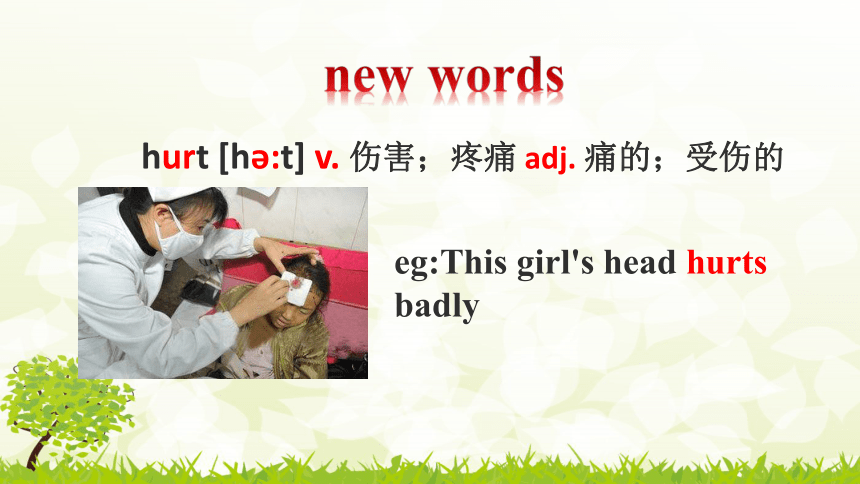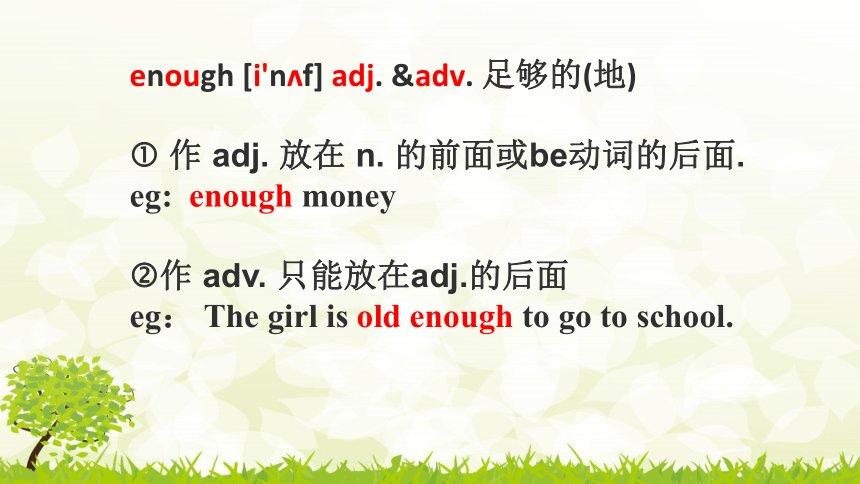冀教版七上英语 U 3 Lesson 16 Happy or sad 课件(共18张PPT)
文档属性
| 名称 | 冀教版七上英语 U 3 Lesson 16 Happy or sad 课件(共18张PPT) |

|
|
| 格式 | ppt | ||
| 文件大小 | 2.8MB | ||
| 资源类型 | 教案 | ||
| 版本资源 | 冀教版 | ||
| 科目 | 英语 | ||
| 更新时间 | 2022-11-30 16:35:38 | ||
图片预览







文档简介
(共18张PPT)
happy
sad
scared
hungry
cool
angry
shy
tired
happy
sad
hurt [h :t] v. 伤害;疼痛 adj. 痛的;受伤的
eg:This girl's head hurts badly
donut ['d un t] n. 面包圈
eg: This is a donut.
enough [i'n f] adj. &adv. 足够的(地)
作 adj. 放在 n. 的前面或be动词的后面.
eg: enough money
作 adv. 只能放在adj.的后面
eg: The girl is old enough to go to school.
laugh[lɑ:f] v. 笑
eg:
Don't laugh loudly in classroom!
hurt [h :t] v. 伤害;疼痛 adj. 痛的;受伤的
donut ['d un t] n. 面包圈
enough [i'n f] adj. &adv. 足够的(地)
laugh[lɑ:f] v. 笑
Read the lesson and answer the questions
1.How does Jenny feel?
2.Is Danny hurt?
3.Is Danny tired?
4.How many donuts does Danny's mother want him to eat
5.Is Danny's mother right
No, he isn’t.
No, he isn’t.
Only one donut a day.
Yes, she is.
She feels happy.
Hi, Danny! I feel happy! How do you feel today
I’m NOT happy.
Oh! What’s wrong Are you hurt
No, I’m not.
Are you tired
No, I’m not. I feel sad. My mum wants me to eat just one donut a day.
Oh, Danny. Don’t be sad. Your mum is right. One donut a day is enough.
Exercise
Example:
A: How do you feel today?
B: I'm ________.
A: What's wrong?Are you __________?
B: Yes , I am./ No , I'm not. I'm________
Work in pairs. How do you feel today?Make up a dialogue.
Summary
2.How do you feel …… 你感觉……?
Reply:I feel ……/ I am …… 我感觉……
3.What‘s wrong 怎么了?
同义句为“What's the matter ”
1. enough [i'n f] adj. &adv. 足够的(地)
作 adj. 放在 n. 的前面或be动词的后面.
作 adv. 只能放在adj.的后面
Work in groups:
1、Can you imitate(模仿) these feelings
2、Can you guess what he/she feels
1. How do you feel …… 你感觉……?
Reply:I feel ……/ I am …… 我感觉……
eg: I feel happy. / I am happy.
2.What's wrong 怎么了?
常用来询问“……出什么毛病了”或“……怎么了?”
同义句为“What's the matter ”
happy
sad
scared
hungry
cool
angry
shy
tired
happy
sad
hurt [h :t] v. 伤害;疼痛 adj. 痛的;受伤的
eg:This girl's head hurts badly
donut ['d un t] n. 面包圈
eg: This is a donut.
enough [i'n f] adj. &adv. 足够的(地)
作 adj. 放在 n. 的前面或be动词的后面.
eg: enough money
作 adv. 只能放在adj.的后面
eg: The girl is old enough to go to school.
laugh[lɑ:f] v. 笑
eg:
Don't laugh loudly in classroom!
hurt [h :t] v. 伤害;疼痛 adj. 痛的;受伤的
donut ['d un t] n. 面包圈
enough [i'n f] adj. &adv. 足够的(地)
laugh[lɑ:f] v. 笑
Read the lesson and answer the questions
1.How does Jenny feel?
2.Is Danny hurt?
3.Is Danny tired?
4.How many donuts does Danny's mother want him to eat
5.Is Danny's mother right
No, he isn’t.
No, he isn’t.
Only one donut a day.
Yes, she is.
She feels happy.
Hi, Danny! I feel happy! How do you feel today
I’m NOT happy.
Oh! What’s wrong Are you hurt
No, I’m not.
Are you tired
No, I’m not. I feel sad. My mum wants me to eat just one donut a day.
Oh, Danny. Don’t be sad. Your mum is right. One donut a day is enough.
Exercise
Example:
A: How do you feel today?
B: I'm ________.
A: What's wrong?Are you __________?
B: Yes , I am./ No , I'm not. I'm________
Work in pairs. How do you feel today?Make up a dialogue.
Summary
2.How do you feel …… 你感觉……?
Reply:I feel ……/ I am …… 我感觉……
3.What‘s wrong 怎么了?
同义句为“What's the matter ”
1. enough [i'n f] adj. &adv. 足够的(地)
作 adj. 放在 n. 的前面或be动词的后面.
作 adv. 只能放在adj.的后面
Work in groups:
1、Can you imitate(模仿) these feelings
2、Can you guess what he/she feels
1. How do you feel …… 你感觉……?
Reply:I feel ……/ I am …… 我感觉……
eg: I feel happy. / I am happy.
2.What's wrong 怎么了?
常用来询问“……出什么毛病了”或“……怎么了?”
同义句为“What's the matter ”
同课章节目录
- Unit 1 School and friends
- Lesson 1 Hello!
- Lesson 2 Teacher and Students
- Lesson 3 Welcome to Our School
- Lesson 4 What Is It?
- Lesson 5 May I Have a Book?
- Lesson 6 Things for School
- Unit 2 Colours and Clothes
- Lesson 7 Jenny's New Skirt
- Lesson 8 Danny's Favourit Colou
- Lesson 9 Whose Coat Is This?
- Lesson 10 Clothes for a Cold Day
- Lesson 11 Clothes around the World
- Lesson 12 Let's Go Shopping!
- Unit 3 Body Parts and Feelings
- Lesson 13 Body Parts
- Lesson 14 Colours and Feelings
- Lesson 15 Tall or Short
- Lesson 16 Happy or Sad
- Lesson 17 Seeing a Docto
- Lesson 18 We All Look Different!
- Unit 4 Food and Restaurants
- Lesson 19 Time for Breakfast!
- Lesson 20 I Like the Supermarket!
- Lesson 21 At the Market
- Lesson 22 In the Restaurant
- Lesson 23 The Corner Store
- Lesson 24 Eat Good Food!
- Unit 5 Family and Home
- Lesson 25 Jenny's Family
- Lesson 26 Li Ming's Family
- Lesson 27 Danny at Home
- Lesson 28 A Family Picnic
- Lesson 29 A Birthday Card
- Lesson 30 Grandma's Birthday Party
- Unit 6 Let's Go!
- Lesson 31 Let's Go to the Bookstore!
- Lesson 32 At the Supermarket
- Lesson 33 Let's Go to the Zoo!
- Lesson 34 On the Farm
- Lesson 35 Let's Go to the Museum!
- Lesson 36 Let's Go to the Movie Theatre!
- Unit 7 Days and Months
- Lesson 37 Seasons and Weathe
- Lesson 38 Nick's Busy Month
- Lesson 39 A Class Calenda
- Lesson 40 When Is Your Birthday?
- Lesson 41 Holidays
- Lesson 42 Happy Holidays!
- Unit 8 Countries around the world
- Lesson 43 Directions
- Lesson 44 Jack's Goodbye Party
- Lesson 45 China
- Lesson 46 Canada and the U.S.
- Lesson 47 The U.K. and Australia
- Lesson 48 English-Speaking Countries
